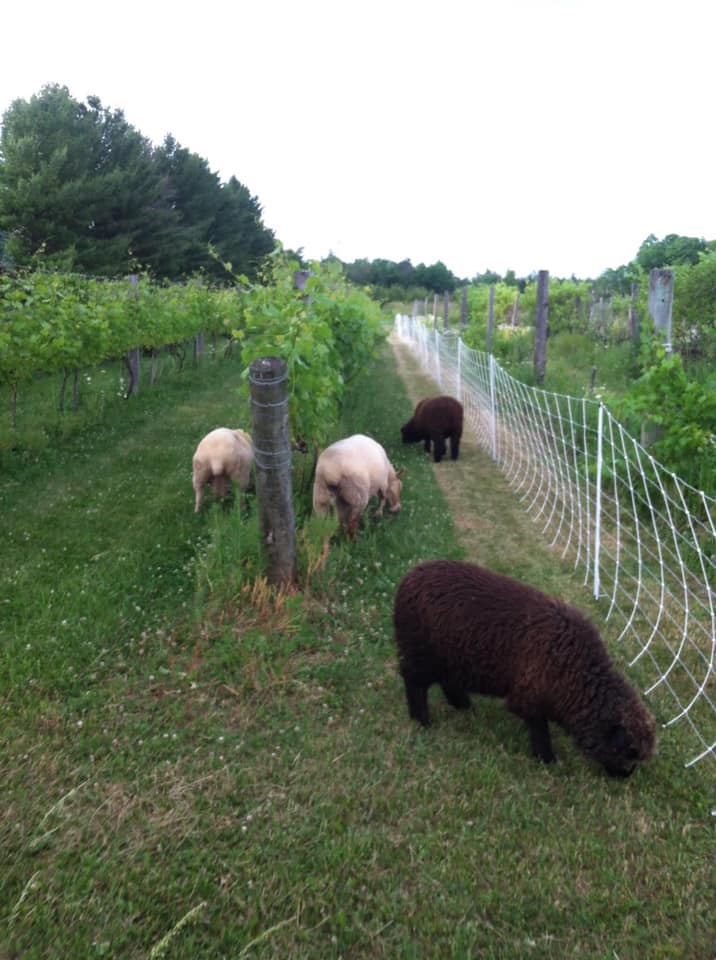What do wine and sheep have in common? No, this is not a pun, it’s sustainable harvesting practices of course! We caught up with Thunder Bay Winery owner/operators Jeremy and Janis Sahr to find out more about these gentle, wooly creatures and how they help around the vineyard.

Vineyard golden retriever, Clatter, enjoying some downtime in the shade between chasing off pests.
There’s always more going on in a vineyard than meets the eye. For Thunder Bay Winery that equates to planting, pruning, mowing, fertilizing, trellis building, green pruning, cluster thinning, leaf pulling, grape harvesting, training volunteers and staff, and the list goes on! There are so many essential tasks to complete that they have found over the years that there is no better way to get the job done right than to enlist a few friends. Human friends are great for certain jobs like picking, but other necessary tasks are better left to the experts. Some of the winery’s enlisted “experts” come in the form of birds and other animals.
“We have purple martin houses to attract nesting birds that readily eat a multitude of flying insects. Our small flock of chickens not only provides us with nutritious eggs, but their constant search for food throughout the vineyard rids it of even more pesky bugs while their nitrogen-rich droppings are left as bonus fertilizer.
Clatter, our beloved vineyard dog, gleefully runs through the vineyard greeting everyone who enters. Clatter also chases away deer, rabbits, and any other animals that could potentially make a mess of things.
Sheep grazing in vineyards and orchards may be one of the oldest practices in farming, but somehow most farmers have moved away from this tried and true practice and toward something else. We were also initially headed along that trajectory with more machinery, pesticides, chemical fertilizers, etc. These practices may have a place in the world, but we decided to look at the big picture and return to something simpler. We feel this better aligned with a healthier, more organic world outlook. This is our second year of grazing sheep in the vineyard and while there’s much yet to learn, I think it’s safe to say they are here to stay!”
Currently, Thunder Bay Winery has 16 sheep grazing about 6 acres of vineyard/orchard and fallow land.

Baa-ram-ewe
Grazing sheep reduces mowing (gasoline consumption) and weeding, eliminating the need for herbicides. Vineyard aisles contain huge amounts of potential forage for animals that essentially go to waste in typical viticultural situations. This dual use of the land makes perfect sense once you see it in action. Rotating sheep throughout the vineyard instead of mowing allows blocks of grass and plants to grow larger and flower. Thereby increasing the diversity of beneficial insects (bees, butterflies, ladybugs, praying mantis, etc., whose numbers have increased greatly), and animals that live in, near, or are visitors to the vineyard.
Sheep are allowed to graze low growing shoots – known as suckers – which saves both time AND the backs of human workers. All of that grazing means a surplus of… you guessed it… poop – manure, more technically!
“Before the sheep came along we had to purchase and spread the manure around ourselves which is both costly and exhausting. The sheep happily create and disperse it for us, along with the chickens, oh, and don’t forget the dog! We also compost all of the waste from our wine production and spread it onto the vineyard floor. This includes grape skins and seeds, apples, pears, and berries, along with anything else we are able to return to the earth. Reducing chemical fertilizer use and increasing manure/compost in the vineyard enhances the soil structure, naturally bringing it into balance. This gives the vines access to all of the micro-nutrients, bacteria, and fungi which should be present in all healthy soil. The healthier they are, the less susceptible to diseases. Which in turn means less intervention in the way of sprays while also greatly improving the wine!
It’s a never-ending learning process. For example, over the years we have tried many methods to keep wild birds from eating our wine grapes. Netting our vines is the only method that has worked for us so far. That said, we have also learned that bird nets and sheep do not mix! We have repaired all of the damaged nets and the sheep are no worse for wear. They happily graze behind the vineyard until the nets are taken down for the year.”
The verdict is still out as to whether tending sheep is indeed easier than conventional methods. Jeremy and Janis personally believe it is better. Either way, it certainly looks and feels like the right thing to do, and that’s reason enough for Thunder Bay Winery!
Stop in for a glass of Thunder Bay Winery wine at their tasting room in downtown Alpena inside the Center Building, 109 N. 2nd Ave. You can also order wine from their website, thunderbaywinery.com, and have wine delivered straight to your doorstep!
Follow on social media for the latest news, updates, and information: https://www.facebook.com/ThunderBayWinery





 420 N. 2nd Ave. Alpena, MI 49707
420 N. 2nd Ave. Alpena, MI 49707 989-340-2288
989-340-2288 